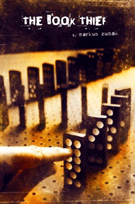The Book Thief

Author: Markus Zusak
List Price: $16.95
Pages: 560
Publisher: Knopf Books for Young Readers (March 14, 2006)
Dimensions: 8.2 x 6.0 x 1.6 inches
ISBN: 0375831002
| Book description |
Death is the narrator of this lengthy, powerful story of a town in Nazi Germany. He is a kindly, caring Death, overwhelmed by the souls he has to collect from people in the gas chambers, from soldiers on the battlefields, and from civilians killed in bombings. Death focuses on a young orphan, Liesl; her loving foster parents; the Jewish fugitive they are hiding; and a wild but gentle teen neighbor, Rudy, who defies the Hitler Youth and convinces Liesl to steal for fun. After Liesl learns to read, she steals books from everywhere. When she reads a book in the bomb shelter, even a Nazi woman is enthralled. Then the book thief writes her own story. There's too much commentary at the outset, and too much switching from past to present time, but as in Zusak's enthralling I Am the Messenger (2004), the astonishing characters, drawn without sentimentality, will grab readers. More than the overt message about the power of words, it's Liesl's confrontation with horrifying cruelty and her discovery of kindness in unexpected places that tell the heartbreaking truth.
Book review
During World War II near Munich, Germany, nine years old Liesel Meminger finds a tome The Gravedigger's Handbook while attending her younger brother's funeral. Unable to resist she takes the book with her. However, she is unable to read the book until fate steps in. Her father is missing and her mother cannot afford her upkeep so she gives Liesel in care to foster parents, acerbic Rosa Hubermann and her kindhearted spouse Hans, who owes a Jew his life.
Hans helps Liesel cope with her nightmares and teaches his ward to read. His chance to pay the war debt to the Jewish soldier who saved his life finally occurs when the man's son, the artist Max, arrives at his house seeking shelter. As Max paints over pages of the Mein Kampf, Leisel steals books from Nazi burnings and begins to write about living at a time of misery caused by fellow humans. If the Nazis catch either one, Death will be a welcome guest.
This is a complex book in which the narrator Death tells the tale of Liesel and Max. Interestingly Death is a cynic when it comes to human behavior especially kindness towards others; the apparition recognizes that his best suppliers of goods are people who in spite of their Golden Rule ramble contain homicidal tendencies rationalized by an ism of some sort. The fascinating asides to the readers are brilliant as they enable the audience to understand the cast he looks upon adding to his collection, but especially Death itself. Give yourself plenty of time, over a week or more, as Markus Zusak has written one of the most haunting tales of the human condition in several years.